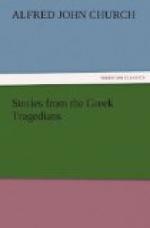“I advise thee not, and, if thou thinkest thus, I would not have thee for helper. But know that I will bury my brother, nor could I better die than for doing such a deed. For as he loved me, so also do I love him greatly. And shall not I do pleasure to the dead rather than to the living, seeing that I shall abide with the dead for ever? But thou, if thou wilt, do dishonour to the laws of the Gods.”
“I dishonour them not. Only I cannot set myself against the powers that be.”
“So be it: but I will bury my brother.”
11 O my sister, how I fear for thee!”
“Fear for thyself. Thine own lot needeth all thy care.”
“Thou wilt at least keep thy counsel, nor tell the thing to any man.”
“Not so: hide it not. I shall scorn thee more if thou proclaim it not aloud to all.”
So Antigone departed; and after a while came to the same place King Creon, clad in his royal robes, and with his sceptre in his hand, and set forth his counsel to the elders who were assembled, how he had dealt with the two Princes according to their deserving, giving all honour to him that loved his country, and casting forth the other unburied. And he bade them take care that this decree should be kept, saying that he had also appointed certain men to watch the dead body.
But he had scarcely left speaking, when there came one of these same watchers and said, “I have not come hither in haste, O King, nay, I doubted much, while I was yet on the way, whether I should not turn again. For now I thought, ’Fool, why goest thou where thou shalt suffer for it;’ and then again, ’Fool, the King will hear the matter elsewhere, and then how wilt thou fare?’ But at the last I came as I had purposed, for I know that nothing may happen to me contrary to fate.”
“But say,” said the King, “what troubles thee so much?”
“First hear my case. I did not the thing, and know not who did it, and it were a grievous wrong should I fall into trouble for such a cause.”
“Thou makest a long preface, excusing thyself, but yet hast, as I judge, something to tell.”
“Fear, my lord, ever causeth delay.”
“Wilt thou not speak out thy news and then begone?”
“I will speak it. Know then that some man hath thrown dust upon this dead corpse, and done besides such things as are needful.”
“What sayest thou? Who hath dared to do this deed?”
“That I know not, for there was no mark as of spade or pick-axe; nor was the earth broken, nor had waggon passed thereon. We were sore dismayed when the watchman showed the thing to us; for the body we could not see. Buried indeed it was not, but rather covered with dust. Nor was there any sign as of wild beast or of dog that had torn it. Then there arose a contention among us, each blaming the other, and accusing his fellows, and himself denying that he had done the deed or was privy to it. And doubtless we had fallen to blows but that one spake a word which made us all tremble for fear, knowing that it must be as he said. For he said that the thing must be told to thee, and in no wise hidden. So we drew lots, and by evil chance the lot fell upon me. Wherefore I am here, not willingly, for no man loveth him that bringeth ill tidings.”




